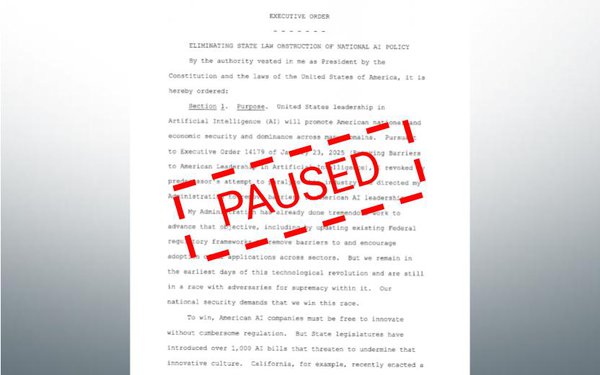
The White House has put on hold a
draft executive order (EO) aimed at preempting state artificial intelligence (AI) regulations that would significantly impact the digital advertising industry's ability to navigate one set
of national rules.
This action allows for the current "patchwork" of state-specific laws to continue developing.
The draft of the executive order would override states’ AI laws by
launching legal challenges and withholding federal funding, according to CNBC.
The draft order, which became public and a matter of public concern last week, would give Attorney General Pam
Bondi 30 days to establish an “AI Litigation Task Force” to challenge state AI laws.
advertisement
advertisement
The primary goal of the paused EO was to prevent a "patchwork" of 50 different state AI laws,
which technology companies argued would stifle innovation and growth. It would, however, ease the burden and create a less complicated compliance landscape.
A U.S. federal law would work
something like the GDPR, Europe’s data protection law, where all countries in the European Union follow one set of laws.
The presence of conflicting state laws, or lack of a unified
federal framework, could create significant legal and operational challenges for advertisers using these technologies across different jurisdictions, according to some.
For now, states follow
their own laws, and it appears from the halt that the federal government's efforts to block states from regulating AI on their own terms remains at a standstill.
The EO also would task
Commerce Secretary Howard Lutnick with determining state AI laws that conflict with the administration’s policy, as well as issue policy guidance making states ineligible for certain
broadband funding if they are found to have such AI laws, reportedThe Hill.
State-level AI
regulations have created what some call a complex compliance landscape for advertisers, primarily focusing on transparency and disclosures.
California, Florida, Utah, and Washington are among some states that have laws mandating
conspicuous disclaimers when political advertisements use AI-generated content.
In another example, a New York bill, the Synthetic Performer Disclosure Bill, requires prominent
disclosures in advertisements that feature AI-generated talent or "synthetic performers."
Georgia also has introduced a similar bill to New York for all AI-generated content in advertising or
commerce.
Earlier this year, Google created an AI synthetic watermark called SynthID, a DeepMind tool designed to embed imperceptible digital
watermarks into AI-generated images, audio, text, or video.
The watermark technology identifies content created or altered by Google AI technology, and it is being
integrated into its products like Gemini.